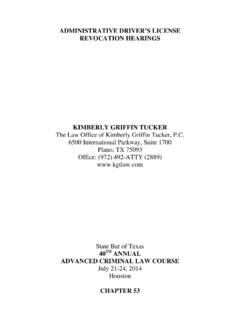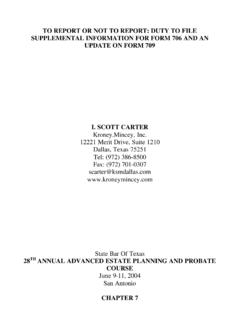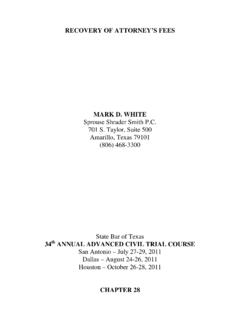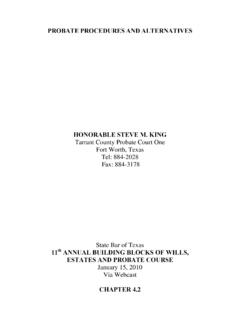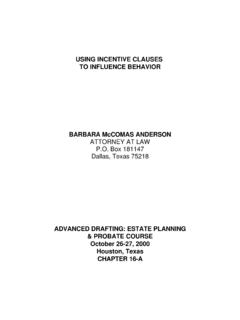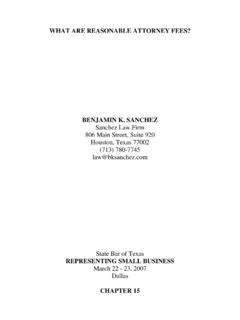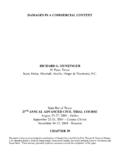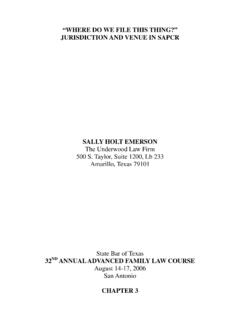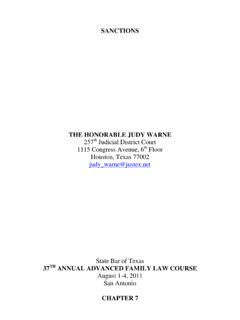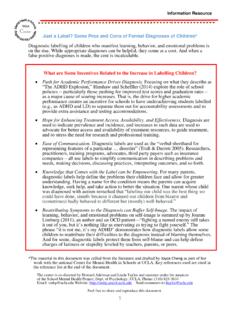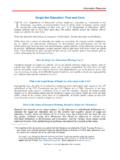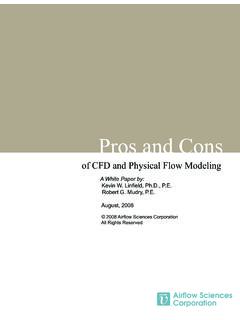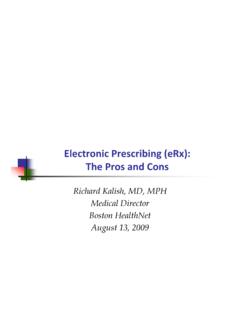Transcription of ARBITRATION (Pros & Cons) - TexasBarCLE
1 ARBITRATION ( pros & Cons) RUBEN D. CAMPOSW ickliff & HallAlamo National Building105 South St. Mary s Street, Suite 700 San Antonio, Texas 78205(210) 225-4100 (Telephone)(210) 225-4153 (Telecopier)STATE BAR COLLEGE SUMMER SCHOOL July 26 28, 2001 Galveston, TexasCHAPTER 7 ABOUT THE AUTHORR uben D. Campos is a shareholder in the San Antonio office of Wickliff & Hall. Mr. Campos is boardcertified as an expert in the field of employment and labor law by the Texas Board of Legal Certification of theState of Texas and has twenty-four years of experience representing employers in the field of employment andlabor Campos was born in Harlingen, Texas and graduated cum laude from the University of Texas in Austin.
2 He obtained his law degree in 1976 from Columbia University in New York City. In his twenty-four years of practicing employment law, Mr. Campos has represented public, private, andnonprofit entities across the United States, from Alaska to Florida. The matters he has handled for his clients haveencompassed every aspect of state and federal employment law. By way of example, he regularly handles litigationmatters alleging employment discrimination, whistleblower violations, constitutional violations, sexual harassment,disability discrimination, wage and hour laws, workers compensation retaliation, union related matters, andgeneral personnel matters.
3 He handled the appeal, brief, and oral argument in Howard Gault Co. v. Texas RuralLegal Aid, et al., a Fifth Circuit case which is the definitive decision on the constitutionality of the Texas laborlaws regulating union strikes, boycotts and mass ( pros & Cons) Chapter 7 TABLE OF Federal ARBITRATION Act, 9 USC 1 et Services and JUDICIAL There a Valid Agreement to Arbitrate?.. to be Arbitrated must fall within the Scope of the ARBITRATION Must be no Statutory Prohibition of ARBITRATION of the ( pros & Cons) Chapter 71 ARBITRATION pros (and a few cons ) ARBITRATION of disputes has steadily beengaining favor in such areas as consumer issues, realestate transactions, and employment.
4 The concept ofarbitration as a substitute for litigation is not new andhas been a fundamental feature in collective bargaining(union relationships) for decades. , Steelworkers & Gulf Navigation Co., 363 574(1960);Consolidated Rail Corp. v. Railway LaborExecutives Ass n, 491 299 (1989). Yet,agreements to arbitrate, and the ARBITRATION processitself, are still viewed with uncertainty by manypractitioners. See, discussion in Gilmer Lane Corp., 500 20 (1991)noting the early suspicions toward ARBITRATION and thevarious reasons for is my observation that the reluctance to acceptarbitration often stems from two general unfamiliarity with the process itself (theprocedures, rules, and mechanics); sense by plaintiff s lawyer s that if their client scase goes to an arbitrator, the potential for a largeverdict is much reduced.
5 This is akin topreferring a jury trial rather than a bench , it is believed that the ARBITRATION processdoes offer distinct advantages include the relatively quick process for resolving thedispute. In contrast to court cases which maytake one or two years, arbitrations can generallybe resolved in two or three monthsBeven faster ifdiscovery is expense: In the ARBITRATION process thereis a tendency to utilize less discovery, expend lessattorney time, and reduce reliance on experts andextraneous witnesses. However, note that manyarbitration agreements do not limit the amount ofdiscovery. (Some agreements do have apredetermined number of depositions which canbe taken).
6 Moreover, the rules of the AmericanArbitration Association, which are oftenincorporated into ARBITRATION agreements, do allowfor discovery plans, depositions, and proceduressimilar to those found in federal court.(See,AAA s National Rules for the Resolution ofEmployment Disputes, http://www. rules 2. html). relatively skilled fact-finder. Although thequality and experience of arbitrators varyconsiderably, generally one can select an arbitratorwith specific experience in the subject matter ofthe dispute. This reduces the time educating thejudge , ensures a more principled approach to theissues, and generally results in a decision based on the law.
7 There is less of a chance that thefact-finder will be carried away or diverted byextraneous award is more likely to fit the facts and thelaw. Although many plaintiff s lawyers complainthat the potential awards are much smaller thanwhat they are likely to receive from a jury, itshould be remembered that arbitrators often adopta Solomonesque approach in cases with closefacts. In other words, rather than an all ornothing result which might be reached by a jury,the arbitrator may determine (implicitly) that thecloseness of the issues warrants some relief toboth sides.
8 This is a common approach in laborarbitration cases involving discharges where anarbitrator may order reinstatement, but the many advantages of arbitrations, thereare many arguments against arbitrations as a compelledprocess. However, as noted by the courts, many ofthese concerns arise from an early suspicion of theprocess. These, however, have been diminished withthe applicability of the Federal ARBITRATION Act ( FAA )and more refined procedures for handling arbitrations. For an exhaustive treatment, and rejection, of thearguments against ARBITRATION , see the discussion onpage 14 below, in Gilmer v.
9 Interstate/Johnson LaneCorp., 500 20 (1991). ARBITRATION ( pros & Cons) Chapter Federal ARBITRATION Act, 9 USC 1 et DescriptionThis federal statute, first enacted in 1925, providesthe general procedural and enforcement mechanismfor arbitrations. In relevant part, it provides:Section 2: A written provision in any maritimetransaction or a contract evidencing a transactioninvolving commerce to settle by ARBITRATION acontroversy thereafter arising out of such contractor transaction .. shall be valid, irrevocable andenforceable save upon such grounds as exist atlaw or in equity for the revocation of : the statute specifically preserves equitableand legal grounds for revoking the agreement : Texas courts have held that the creation ofan employment relationship which involved commerceis a sufficient >transaction to fall within Section 2 ofthe Act.
10 , In re Leadership Ford, Inc., (1999 Lexis 4708) (Tex. App. 5th Dist. Dallas,1999)(compelling ARBITRATION of employee s on-the-jobinjury pursuant to alternative worker s comp plan). Section 4 of the FAA provides for federaljurisdiction of suits to compel ARBITRATION . Subsequentprovisions describe the mechanics of ARBITRATION ,selection of arbitrators, and enforcement of the awardin for vacating an Section 10, there are limited grounds forsetting aside an award that has been rendered throughthe ARBITRATION procedure. These statutory grounds areas follows:wWhere the award was procured bycorruption, fraud, or undue means;wWhere there was evident partiality orcorruption in the arbitrators;wWhere the arbitrators were guilty ofmisconduct in refusing to postpone thehearing, refusing to hear pertinent evidence,or any other misbehavior by which the rightsof a party have been prejudiced.
